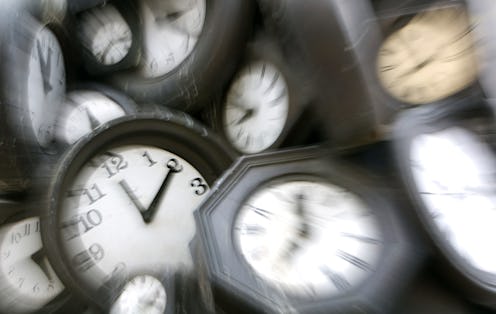Like most highly organized people, I am almost never late for anything. I have also never been able to understand exactly why other people are always late — but hey, guess what? It turns out there's a scientific reason for it: Type A people and Type B people may actually experience time differently. To be clear, it's still not an excuse for always being late (perhaps the strongest indicator that I'm a Type A person is the fact that as far as I'm concerned, the only acceptable excuse for lateness or failing to meet deadlines is an act of god) — but knowing why it's happening can be useful for people on both ends: It can help Type B people manage their lateness, and it can help Type A people not get bent out of shape when they're left waiting.
The research in question isn't new; it is, however, making the rounds again — and since timeliness never goes out of style, it's definitely worth taking a look at again. According to the Wall Street Journal, Dr. Jeff Conte led a number of studies in the early 2000s that demonstrated some fundamental personality differences between people who were always on time and people who were always late. One of them, which was published in 2002 in the Journal of Applied Social Psychology, asked 118 emergency room nurses — that is, people who “typically face high time-urgent demands” — and 145 small-town librarians — people who “typically face low time-urgent demands” — to estimate how long a minute lasts. The nurse estimated on average 58 seconds, while the librarians estimated 77 seconds. From this, the researchers determined that Type A people tend to have more accurate internal clocks — hence why they're often not only on time, but early. Type B people, with their more relaxed sense of time and urgency, tend towards lateness.
Obviously this isn't the only factor that can contribute to someone being late or early, but I think it's worth bearing in mind. Even knowing that some people experience time differently than other people, though, that doesn't leave either perpetually late people or habitually punctual people off the hook for their behavior. Both types can cultivate qualities that will make coping with lateness easier — either by putting in the effort to be on time, or by developing strategies to help you not fly off the handle when someone else is late.
How Type B People Can Cultivate Punctuality:
- Set your clock ahead. This is an oft-cited piece of advice, but I kind of feel like the only way it'll actually work is if you have someone other than yourself move all of your clocks ahead for you — without telling you how early they now are. Knowing you set your own watch (or phone, or whatever) five minutes ahead will make it easy to think, “But, well, I already set it ahead, so I actually have five extra minutes.” Not knowing whether your clocks are accurate will make it harder to rely on this sort of justification. Note that I have no science to back this theory up — but it might be worth trying anyway. Let me know if does or doesn't work.
- Break your tasks down into smaller pieces. According to a 2004 study, one of the big reasons for perpetual lateness is a tendency to underestimate how much time any given task will take. Breaking each task down into smaller pieces, however — that is, “unpacking” them — was found to help people give more accurate time estimates. This will not only help you stay on schedule, but also help give other people a better idea of what your schedule is.
- Don't just shrug and say, “Well, that's just the way I am.” We've talked about this a lot lately, but the key to changing any sort of habit — whether it's a good one or a bad one — is to be proactive about it. You have to want to make the change in order for it to be successful, as well a give yourself time to make it in the first place. 66 days, remember?
How Type A People Can Cope with Lateness:
- If you're meeting someone you know is perpetually late, squelch the urge to arrive early. If you arrive right on time instead of a few minutes early, you'll spend less time waiting. And hey, if the worst happens and you get held up, odds are you'll either arrive right when the person you're meeting does.
- Point it out, but be nice about it. For all my Type A-ness, I am often a pushover: I hate confrontation, so if someone keeps me waiting, I'm way more likely to say, “It's fine!” than I am to say that I think perpetual lateness is annoying and inconsiderate. But they're never going to know how much their lateness bothers you if you don't speak up. Saying something like, “I really enjoy spending time with you, but when you show up late so frequently, it makes me feel like maybe you don't enjoy spending time with me. What's going on?” might work; it'll at least open up the conversation. Drawing attention to it might make them think about it more from the perspective of the person on the other end.
- Plan for lateness. If it's going to happen, you may as well prepare for it. Bring something to keep yourself occupied while you're waiting — whether it's work, a personal project, or just a good book. Also, in the event of late people who also tend to be a little bit selfish, don't stay later than the agreed upon time — no matter how late your companion is. This will both keep you on schedule, as well as communicate to them that you won't rearrange your entire schedule for them.
Images: Giphy (3)
